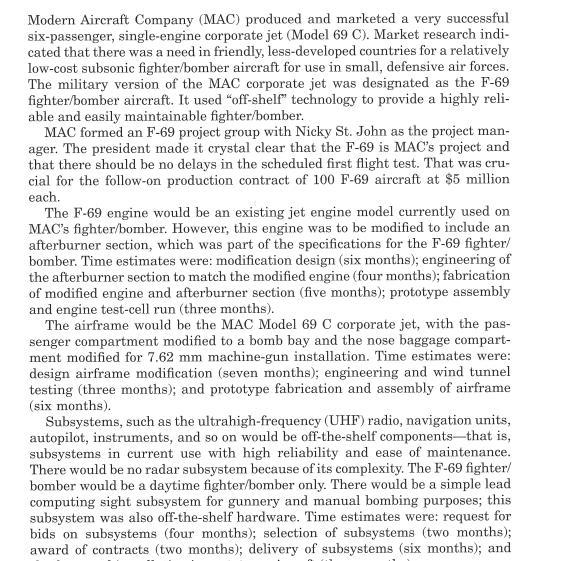Answered step by step
Verified Expert Solution
Question
1 Approved Answer
Modern Aircraft Company (MAC) produced and marketed a very successful six-passenger, single-engine corporate jet (Model 69 C). Market research indi- cated that there was



Modern Aircraft Company (MAC) produced and marketed a very successful six-passenger, single-engine corporate jet (Model 69 C). Market research indi- cated that there was a need in friendly, less-developed countries for a relatively low-cost subsonic fighter/bomber aircraft for use in small, defensive air forces. The military version of the MAC corporate jet was designated as the F-69 fighter/bomber aircraft. It used "off-shelf" technology to provide a highly reli- able and easily maintainable fighter/bomber. MAC formed an F-69 project group with Nicky St. John as the project man- ager. The president made it crystal clear that the F-69 is MAC's project and that there should be no delays in the scheduled first flight test. That was cru- cial for the follow-on production contract of 100 F-69 aircraft at $5 million each. The F-69 engine would be an existing jet engine model currently used on MAC's fighter/bomber. However, this engine was to be modified to include an afterburner section, which was part of the specifications for the F-69 fighter/ bomber. Time estimates were: modification design (six months); engineering of the afterburner section to match the modified engine (four months); fabrication of modified engine and afterburner section (five months); prototype assembly and engine test-cell run (three months). The airframe would be the MAC Model 69 C corporate jet, with the pas- senger compartment modified to a bomb bay and the nose baggage compart- ment modified for 7.62 mm machine-gun installation. Time estimates were: design airframe modification (seven months); engineering and wind tunnel testing (three months); and prototype fabrication and assembly of airframe (six months). Subsystems, such as the ultrahigh-frequency (UHF) radio, navigation units, autopilot, instruments, and so on would be off-the-shelf components-that is, subsystems in current use with high reliability and ease of maintenance. There would be no radar subsystem because of its complexity. The F-69 fighter/ bomber would be a daytime fighter/bomber only. There would be a simple lead computing sight subsystem for gunnery and manual bombing purposes; this subsystem was also off-the-shelf hardware. Time estimates were: request for bids on subsystems (four months); selection of subsystems (two months); award of contracts (two months); delivery of subsystems (six months); and checkout and installation in prototype aircraft (three months). Upon completion of the prototype F-69 fighter/bomber, there would be a series of powered checks, taxi tests, and the like for one month, followed im- mediately by the first test flight. If all tests were successful, the F-69 prototype design and the specifications would be used for the production phase. Question: If there was a one month delay in obtaining bomb bay racks for the F-69 bob bay, should Nicky St. John authorize the use of overtime to make up for this delay?
Step by Step Solution
★★★★★
3.38 Rating (164 Votes )
There are 3 Steps involved in it
Step: 1
The decision to authorize overtime to make up for a onemonth delay in obtaining bomb bay racks for t...
Get Instant Access to Expert-Tailored Solutions
See step-by-step solutions with expert insights and AI powered tools for academic success
Step: 2

Step: 3

Ace Your Homework with AI
Get the answers you need in no time with our AI-driven, step-by-step assistance
Get Started


